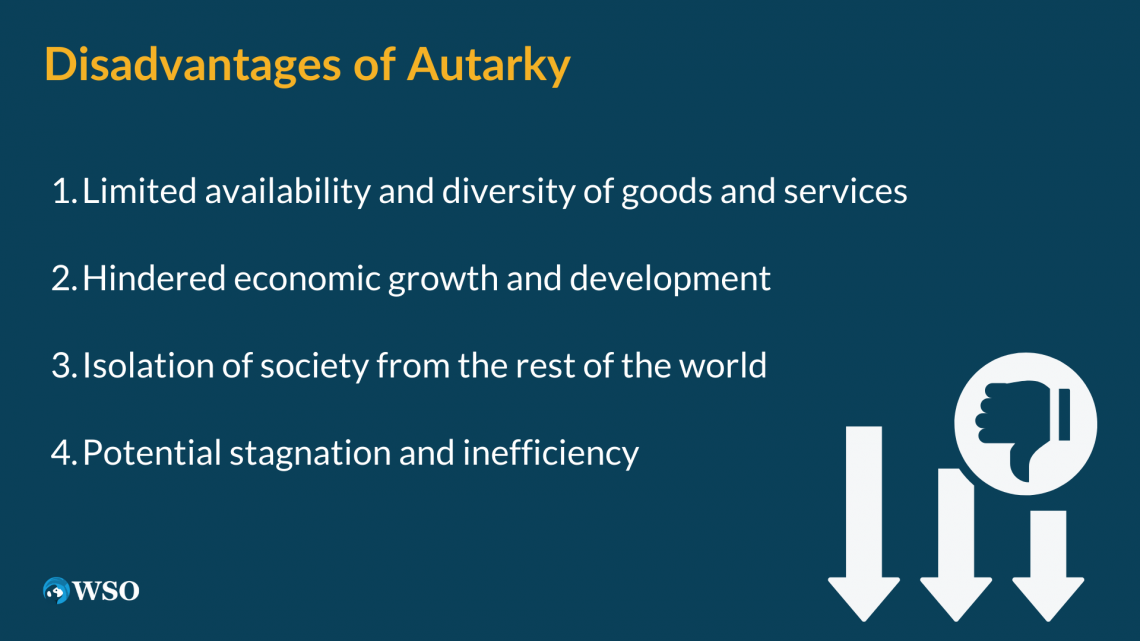Autarky
It means that a country or region is self-sufficient and does not rely on others for their needs.
What is Autarky?
Autarky's etymology stems from Greek. The word autarkēs can be translated as self-sufficiency. Being able to sustain oneself without dependence on external sources or influences is the essence of independence.

States, economic systems, communities, or individuals can all use this pattern of organization to varying degrees. For example:
- A person who lives off the grid and grows their food is practicing Autarky on an individual level.
- A country that does not trade with other countries and produces everything it needs within its borders is practicing Autarky on a national level.
- An economic system that does not depend on foreign markets or resources is practicing it on a systemic level.
Advocating for this particular structure has been a common theme in the history of political movements and ideologies. Its goal typically involves resisting outside domination, achieving independence, or fostering self-reliance.
Some autarkic movements include:
- African Socialism
- Mutualism
- War Communism
- Communalism
- Swadeshi
- Syndicalism
- Left-Wing Populism
These movements often aim to build alternative economic structures or to control resources against structures they view as hostile or oppressive.
However, it also has its drawbacks and limitations. Economic theory argues that a lack of governance can benefit economic growth and welfare. This looks like free trade and open markets.

It also argues that protectionism and isolationism have adverse effects. Goods and services may become scarce due to the current system and inhibit progress, hindering efficiency.
Following this system can also make a country or a system more vulnerable to internal shocks or crises since it cannot diversify or adjust to changing conditions.
This economic structure is a complex and controversial concept with different implications depending on the context and the perspective. This strategy can be seen as a desirable goal or as an undesirable obstacle, depending on one's values and interests.
Autarky can be a source of strength or weakness, depending on one's circumstances and challenges.
Key Takeaways
- Autarky means that a country or region is self-sufficient and does not rely on others for their needs. This achieves trade independence.
- Industries within a nation can find a safeguard against foreign competition by establishing this framework, leading to increased independence within the economy.
- External shocks or conflicts that could harm the autarkic economy and disrupt trade are less likely when it is reduced by improving it.
- It can promote a sense of national pride and identity among the people.
- It creates political tensions that can isolate the country or region from the rest of the world. This can cause social tensions to arise.
Understanding the Autarky
Autarky is a form of economic structure that isolates the economy from all outside influences and achieves a form of self-sufficiency.

According to some, this structure can be beneficial as it shields a nation or community against possible outside dangers. They might argue that autarky can promote national identity, cultural diversity, and environmental sustainability.
One of the main disadvantages of this economic structure is that it limits economic growth. By not trading with other countries or regions, a country or a group misses the benefits of specialization, comparative advantage, and economies of scale.
Goods and services production might not be sufficient to cater to personal consumption; thus, unsatisfactory needs and demands may arise.
They might also face hostility and resentment from other countries or regions that view them as selfish, arrogant, or backward. This can result in conflicts, wars, or sanctions, harming their well-being and security.

Many economic systems have the potential to provide growth and development through cooperation and trade. Conversely, systems that need more opportunities fall short in comparison.
They can also excel in social and political integration and harmony. For example, free trade is an economic system where countries or regions reduce or eliminate trade barriers. This includes tariffs, quotas, and subsidies.
Compared to autarky, free trade can provide a higher economic growth rate. This can be attributed to the spill-over effect. When a country develops new technology or makes a scientific breakthrough, unfettered trade can ensure this new innovation spreads to other countries.

This raises the technology level of countries that lack the resources to conduct extensive research and development. As a result, economic growth is higher in open economies than in autarkies.
However, it can also have many costs regarding growth and development, isolation, and stagnation. Efficiency and productivity can be boosted through collaboration and trade with other regions, making alternative economic systems highly advantageous.
Note
Each country or group must consider its own objectives, principles, and desires when selecting an economic system.
Advantages of Autarky
This form of economics can be applied to different levels of society. This structure is a policy of achieving self-reliance and becoming independent from external influences.

It can be motivated by various reasons such as political ideology, national security, environmental protection, or cultural preservation.
Some of the advantages of this structure include:
- Reduced dependence on foreign trade and resources: This can make a society more resilient and less vulnerable to external shocks. Outside factors such as wars, sanctions, natural disasters, and market fluctuations have less impact on autarkic societies because they are more independent.
- Greater local production and consumption: It can create more jobs, stimulate innovation, and support local communities and cultures.
- Improved environmental sustainability: It can reduce the ecological footprint of transportation, packaging, and waste associated with global trade. Autarky can also encourage the use of renewable and local resources and the preservation of biodiversity.
- Enhanced national sovereignty and identity: It can avoid foreign interference and influence in domestic affairs. Autarky can also foster a sense of pride and solidarity among people who share a common vision and goal.
Disadvantages of Autarky
Some of the drawbacks of this structure are:

- Limited availability and diversity of goods and services: This can lower the quality of life and consumer satisfaction.
- Hindered economic growth and development: This may restrict trade and investment opportunities. This structure can also reduce the benefits of specialization, comparative advantage, and learning from other countries.
- Isolation of society from the rest of the world: It can cut off cultural exchange and cooperation. This structure can also breed intolerance and hostility towards other societies with different values and interests.
- Potential stagnation and inefficiency: May discourage competition and innovation. Autarky can also create complacency and inertia among people who lack external challenges and incentives.
As you can see, autarky has positive and negative aspects that must be carefully weighed before adopting it as a strategy or goal.
It may not be a realistic or desirable option for most societies in today's interconnected world because trade and cooperation can bring more benefits than costs for both individuals and nations.
However, it can be beneficial. Some degree of independence can help maintain balance in the world.
History of Autarky
"Self-sufficiency" or "self-rule" is the meaning behind the Greek word "autarkeia" to create the term. The ancient Greeks valued autarky as a virtue, especially for their city-states, which tried to be as autonomous as possible.

They also applied it to individuals who aimed to be free from external influences and desires. The concept originated from the works of German philosopher Georg Friedrich Hegel, who advocated for a strong central government that limited citizen involvement.
Hegel believed trading with other nations was detrimental to one’s economy, leading to his advocacy for self-sufficient economies. A push towards autarky took place in the United States during the Great Depression as heavy government regulation took hold of the economy.
The Smoot-Hawley Tariff significantly raised US tariffs and represented the protectionist ideology then. Another example of a more extreme autarkic economy can be seen in Hitler’s Germany.
Today, autarky is uncommon or realistic in a globalized world, where trade and cooperation are essential for development and prosperity. Seeking to minimize dependence on external factors and maximize self-reliance and self-determination, some still refer to this mindset or lifestyle as autarky.

For example, some environmentalists advocate for autarky to reduce the ecological footprint and live more sustainably.
Autarky, a concept endorsed by certain anarchists, can be utilized as a method to combat the dominion and subjugation instituted by the establishment and business entities.
This was also a concept in economics, where it meant a situation where a country or a region does not trade with others but produces everything it needs by itself.
To protect the country's interests and reduce reliance on foreign markets, this was viewed as a potential solution.
However, autarky also had some drawbacks, such as limiting the variety and quality of goods and services and preventing the benefits of specialization and comparative advantage.
Note
North Korea, Nazi Germany, and Albania are examples of countries that have attempted to achieve autarky.
Autarky in Nazi Germany
Hitler wished for Germany to attain total self-sufficiency for two critical motives. One was to circumvent the financial predicaments that Germany experienced in the aftermath of World War I.

Those hardships involved the payment of extensive reparations and a great deal of hyperinflation and unemployment.
Another objective of Hitler was to prime Germany for war by guaranteeing the availability of ample rations and raw resources to promote the maintenance of its armed forces and commerce.
How did Hitler try to achieve autarky? He had several policies and plans that aimed to make Germany more self-sufficient. For example:
- Infrastructure: He launched a massive public works program that created jobs and improved infrastructure. He built hospitals, schools, stadiums, and, most famously, the autobahns (highways).
- Military: He started rearming Germany in 1935, which boosted the economy and created millions of jobs for German workers. He also conscripted young men into the army or the National Labour Service, which reduced unemployment.
- Agriculture: He appointed Hermann Goring as the leader of the Four-Year Plan in 1936. This was supposed to make Germany ready for war in four years. Goring tried to increase agricultural production by giving subsidies to farmers and imposing price controls.
Note
He tried to reduce imports by developing synthetic substitutes for oil, rubber, and textiles.
Did Hitler succeed in making Germany autarkic? Not really. Despite his efforts, Germany depended on foreign trade for many essential goods. By 1939, Germany was still importing much of its food and raw materials.
Hitler also faced a dilemma: should he invest more in guns (military goods) or butter (civilian goods)? He chose guns, which meant that the living standards of ordinary Germans did not improve much under his rule.
This economic structure limits economic growth and innovation potential. Its isolationist policies can harm the economy in the long run.
What is the Autarkic Price?
The price of a good or service within a self-sufficient economy that doesn't engage in international trade is known as autarkic price. The cost of production, which the producer must bear, refers to the expenses incurred during the manufacturing process.

Autarkic price is different from the market price, which is determined by the forces of supply and demand in an open economy that engages in international trade.
But why is autarkic price important? On a country's welfare and competitiveness, the effects of trade can be understood with some help.
It means the country has a comparative advantage in producing a good or service if the autarkic price is lower than the market price.
This means that the country can benefit from exporting that good or service to other countries and earn more revenue than it would by selling it domestically.
Producing a certain product or service might not be advantageous for a country if its autarkic price surpasses the market price. In this scenario, the country would suffer from a comparative deficit.

This means that the country can benefit from importing that good or service from other countries and pay less than it would produce domestically.
Illustrating this concept is best done through some examples, so let me share a few with you.
Buying wheat in Country B will cost you $3 per kilogram. In contrast, the price is $2 per kilogram in Country A.
This means that Country A has a comparative advantage in producing wheat since it can produce it at a lower cost than Country B. Therefore, Country A can export wheat to Country B and earn $3 per kilogram, more than its autarkic price of $2 per kilogram.
This will increase Country A's income and welfare.
The market price of cars in Country D is $15,000 per unit. In contrast, the autarkic price of cars in Country C is $20,000 per unit. This means that Country C has a comparative disadvantage in producing cars since it can produce them at a higher cost than Country D.
Therefore, Country C can import cars from Country D and pay $15,000 per unit, less than its autarkic price of $20,000 per unit. This will decrease Country C's expenditure and increase its welfare.

As you can see, autarkic prices can help us analyze the gains and losses from trade for different countries and goods or services.
However, autarkic price is not always easy to measure or observe since most countries are not completely closed economies and have some degree of trade with other countries.
Moreover, the autarkic price does not consider other factors affecting trade decisions, such as tariffs, quotas, subsidies, preferences, quality differences, transportation costs, etc.
An accurate reflection of reality cannot be portrayed by autarkic price despite it being theoretical. Though helpful for basic comprehension of trade theory, relying solely on it would be unwise.




or Want to Sign up with your social account?